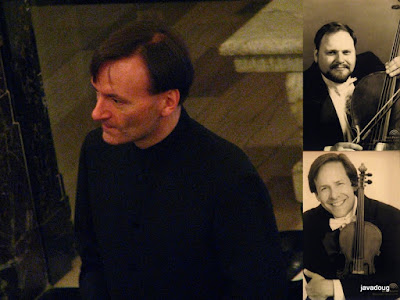In addition to being a blogger I'm also a subscriber to the PSO's season, and I try to attend as many concerts as I can. This evening began when I entered the lobby. I was fortunate to listen to Katherine M Zhou, the Steinway Society Young Artist Winner play many selections in the lobby. She was wonderful on the piano, and when the last selection came, I knew I could recognize that tune. I told myself that it sounded like Edvard Grieg, even though I didn't know for sure. And when I found the program notes, it was indeed Grieg's "March of the Dwarfs" - a selection full of gratifying melody that one could remember for hours, yet I wouldn't have that luxury, because the PSO concert would begin shortly.
Maestro Tortelier, as is his wont, began the concerto as soon as Mr Hough was seated at the piano - there was not laborious introduction - and we all delved right into the music. Right away we could hear Mr. Hough's style of playing, his mastery and his romanticism.
His debut with the PSO was nothing less than superb. The concerto seemed to begin as a march, but soon went off into certain furious passages on the piano, then intermixed with simpler tones and notes, somehow mixed into a suitable opening. Some of the piano parts were so technically challenging, my mind could not begin to try to assimilate the kind of skill necessary. The audience applauded after the first movement, and it was a joy to see Mr. Hough's smile and a lip synched 'thank you'.

The second movement was more my style, a trio with the cello, violin and piano with orchestra as the backdrop keeping time. the final movement was a tuneful spirited fare with lots of melody and songs arrayed as items along a musical path, racing with joyful fun. At it's conclusion the whole of the audience immediately rose to raucous applause.
For an encore Stephen Hough played the selection "Moscow Nights," except it seemed to begin with the a Rachmaninov theme, and for a moment I thought he would play a Rachmaninov concerto as an encore, but then it immediately moved into the Moscow Nights music. At intermission a very congenial man named Fred introduced himself while observing me taking photographs of Mr. Hough. He struck up a conversation, and told me the story set in 1987, Van Cliburn was invited to perform at the White House for President Ronald Reagan and Soviet president Mikhail Gorbachev, and that it was Gorbachev's wife who asked for Mr. Cliburn to perform Moscow Nights. I knew the melody, but had never heard the name of the Russian song, originally composed in 1955.
After intermission came another delightful performance by Maestro Tortelier and the PSO with the Prokofiev symphony! My favorite parts were the 2nd - reminding me of dance - perhaps a rumba or tango - and we saw conductor Tortelier dancing with the orchestra (it takes two), then the deep tones of the 3rd followed by the 4th and final movement; it seemed to get better and better as the symphony progressed. This was no classical symphony like his first symphony, which is delightful in it's own beautiful style. This symphony was full of new and romantic themes. One of my favorite aspects was the impression I had that the tempos were like a metronome or perhaps like a clock keeping time, sometimes pushed by the basses or brass, and it kept progressing and eventually moved through and into the stirring finale, another robust conclusion which did bring warmth to my heart.



No comments:
Post a Comment